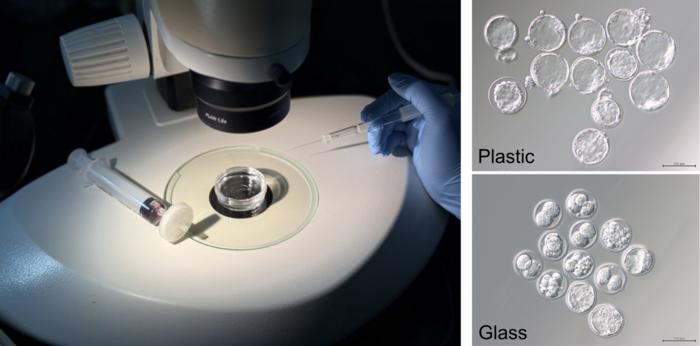Researchers have identified an unexpected culprit behind developmental issues in lab-fertilized embryos – ordinary laboratory glassware. The common equipment releases zinc that can significantly alter early embryo development and increase birth weights by an average of 18 percent, according to a study published April 2 in Biology of Reproduction.
The multinational research team, led by Professor Kazuo Yamagata at Kindai University in Japan, discovered that zinc leaching from glass instruments can disrupt chromosome segregation and gene activation during critical developmental stages. Their findings may explain previously mysterious failures in assisted reproduction and could lead to improved success rates in both human and animal IVF procedures.
“We identified Zn eluted from glassware as an embryotoxic substance,” the researchers noted in their paper. Common laboratory items like glass pipettes, filters containing glass fibers, and glass-bottom observation dishes all released varying levels of zinc into culture media.
The discovery came during routine experimentation when researchers noticed unexplained declines in embryo development rates despite consistent laboratory conditions. After systematic investigation, they identified zinc concentrations as low as 6 micromolar – well within the range leached from standard glassware – could significantly impair mouse embryo development.
Mouse embryos proved particularly sensitive to zinc exposure during the first 48 hours after fertilization, with noticeable abnormalities in chromosome segregation and cell division. While many affected embryos simply failed to develop normally, those that reached full term exhibited significantly higher birth weights than controls.
Human and bovine embryos were also affected by zinc exposure, though with varying sensitivity between species. In human embryos, researchers observed a significant increase in “direct cleavage” – a type of aberrant blastomere cleavage characterized by multiple cytoplasmic divisions per cleavage.
The study highlights how seemingly minor factors in laboratory environments can have substantial biological consequences. “This research not only highlights the importance of risk control in embryo culture but also facilitates the development of safe and effective methods for assisted reproduction,” the research team explained.
The researchers identified potential countermeasures to mitigate zinc toxicity. Adding chelating agents like EDTA to culture media specifically during the zinc-sensitive developmental window effectively protected embryos, allowing for normal full-term development. Pre-washing glassware thoroughly before use also improved outcomes.
The accompanying press release notes: “The findings of this study lead to the development of safer and more effective in vitro fertilization methods.”
As assisted reproductive technologies continue advancing globally – resulting in over 9 million births since 1978 with 2.4 million treatments performed annually – these insights into subtle laboratory factors may help further improve success rates in fertility treatments.
For prospective parents navigating fertility treatments, this research offers hope that refinements in laboratory protocols could lead to more reliable outcomes. Meanwhile, scientists in fields ranging from human medicine to livestock breeding and developmental biology now have valuable information to enhance their experimental controls.
If our reporting has informed or inspired you, please consider making a donation. Every contribution, no matter the size, empowers us to continue delivering accurate, engaging, and trustworthy science and medical news. Independent journalism requires time, effort, and resources—your support ensures we can keep uncovering the stories that matter most to you.
Join us in making knowledge accessible and impactful. Thank you for standing with us!

